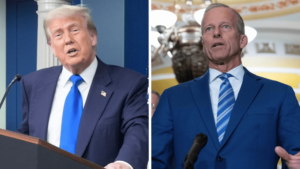Congress
White House tweaks AIDS funding rollback to assuage skeptical Republicans
The White House is trying to assure House Republicans wary of plans to slash global AIDS funding that the administration will spare some prevention programs that would have been on the chopping block.
The promises come as GOP leaders race to shore up votes for a $9.4 billion spending cuts package ahead of a scheduled Thursday vote. The planned cuts to the President’s Emergency Plan for AIDS Relief, a signature effort of former President George W. Bush that is credited with saving millions of lives, have been especially problematic for many Hill Republicans.
In recent days, White House officials have conveyed to GOP leaders that they will not only maintain life-saving treatments under PEPFAR but will also — in response to concerns from more than a dozen House Republicans — preserve some prevention programs as well, according to three people granted anonymity to discuss the private assurances.
Speaker Mike Johnson’s whip team spent Monday evening on the House floor counting votes on the overall “rescissions” package, which targets public broadcasting and broader foreign aid efforts, in addition to the hundreds of millions of dollars in overseas AIDS funding. The whip team conveyed the altered plans in conversations and text messages with lawmakers. Some Republican lawmakers have pressed the White House directly about Trump’s request to nix funding for fighting AIDS around the globe.
White House budget director Russ Vought told appropriators last week that the Trump administration wants to take “an analytical look” at “the prevention itself” and instead fund “life-saving treatment” for people with AIDS. But Vought said the White House is still planning to scale down PEPFAR and other programs.
“It is something that our budget will be very trim on,” Vought said of funding AIDS prevention work, “because we believe that many of these nonprofits are not geared towards the viewpoints of the administration. And we’re $37 trillion in debt. So at some point, the continent of Africa needs to absorb more of the burden of providing this health care.”
Lawmakers are also raising concerns about deep cuts across public media — targeting PBS and NPR, as well as their local affiliates.
Nevada Rep. Mark Amodei, a top GOP appropriator, said in a brief interview Tuesday morning that he spoke with Majority Whip Tom Emmer on the House floor Monday evening about trying to spare local PBS affiliates from deep funding cuts. Amodei said he is pressing for more information about how local affiliates get funding from the larger public media networks and if there is a way lawmakers can cut off the networks without harming the affiliates.
Jennifer Scholtes contributed to this report.
Congress
Thom Tillis denounces GOP megabill’s Medicaid cuts in fiery speech
Hours after announcing his retirement, Republican Sen. Thom Tillis went to the Senate floor and slammed the GOP’s plans for drastic Medicaid cuts — warning Republicans they are about to “make a mistake on health care and betray a promise” if their sprawling domestic policy bill passes.
“It is inescapable this bill will betray the promise Donald Trump made,” Tillis said. “I’m telling the president that you have been misinformed. You supporting the Senate mark will hurt people who are eligible and qualified for Medicaid.”
Tillis, who opposed the bill on a procedural vote Saturday night and then announced Sunday he would not seek reelection, said he could not vote for the Senate’s bill because of provisions that he said would kick some 663,000 residents of his state off their health care plans. He called on the Senate GOP to jettison its “artificial” July 4 deadline and rewrite the bill.
“I respect President Trump, I support the majority of his agenda, but I don’t bow to anybody when the people of North Carolina are at risk, and this puts them at risk,” Tillis told reporters after he left the floor.
The two-term senator who has been known for working across the aisle said he had done his own research on how changes to so-called state directed payments and a new cap on medical providers taxes would affect his state — contacting state legislative leaders, the state’s Democratic governor, Josh Stein and hospital groups.
Tillis said he also talked to CMS Director Mehmet Oz and presented his findings that showed the best-case scenario was a $26 billion cut in federal support.
“After three different attempts for them to discredit our estimates, the day before yesterday they admitted that we were right,” Tillis said on the floor. “They can’t find a hole in my estimate.”
In his remarks to reporters, he said Trump is “getting a lot of advice from people who have never governed and all they’ve done is written white papers,” adding that he has “people from an ivory tower driving him into a box canyon.”
Tillis, who was elected to the Senate in 2014, compared Trump’s “big, beautiful bill” to the Affordable Care Act: “The effect of this bill is to break a promise. And you know, the last time I saw a promise broken around health care, with respect to my friends on the other side of the aisle is when somebody said, ‘If you like your health care, you can keep it.’”
The Senate is now working through up to 20 hours of debate, before a marathon voting series of amendments scheduled to start Monday morning. Tillis said he might return to the floor to speak against the bill.
Trump lambasted Tillis Saturday night after he voted against opening debate on the megabill, and Tillis said he’d already told Trump at that point he was likely to retire.
“Pretty much what I said on the floor is what I said to the president last night and I stand by it,” Tillis told reporters after the speech, adding later that he told the President he “probably needed to start looking for a replacement.”
“I told him I want to help him,” Tillis added. “I hope that we get a good candidate that I can help and we can have a successful 2026.”
Congress
Rick Scott drafts key Medicaid amendment ahead of voting marathon
Florida Sen. Rick Scott is circulating text of his amendment to the GOP megabill that would effectively end a key Medicaid financing mechanism after 2030.
The provision won the backing of Senate Majority Leader John Thune during an eleventh-hour negotiating session held Friday night as a procedural vote was held open to win over Scott and other holdouts. It is expected to come up during the “vote-a-rama” set to take place overnight Sunday into Monday where dozens of amendments will be debated and voted on.
Scott said Sunday he’s “very confident that my amendment is going to pass.” Other Republicans are skeptical, with several in the GOP ranks nervous about cutting too deeply into Medicaid.
Under the amendment, the federal government’s 90 percent cost share for Medicaid enrollees made newly eligible under the 2010 Affordable Care Act will end on Dec. 31, 2030. Beneficiaries who were enrolled prior to that date would be grandfathered in at the old rate, but new enrollees would see their medical costs reimbursed at the lower “FMAP” rate, which can be as low as 50 percent, with states picking up the rest.
The amendment is co-sponsored by GOP Sens. Ron Johnson of Wisconsin, Mike Lee of Utah and Cynthia Lummis of Wyoming, as well as Finance Chair Mike Crapo of Idaho.
Congress
Republicans move forward with controversial megabill accounting move
Senate Republicans are on the cusp of formally adopting a controversial accounting tactic to zero out much of the cost of their massive domestic policy bill.
The matter came to a head on the Senate floor Sunday afternoon, when Democrats sought to prevent the use of the current policy baseline, as the tactic is known. Minority Leader Chuck Schumer objected to the maneuver and accused Republicans of setting a new precedent with the “budgetary gimmick.”
The Senate is set to vote on Schumer’s objection later Sunday or Monday, but Republicans believe their members will back up Senate Majority Leader John Thune and Senate Budget Chair Lindsey Graham.
That’s in part because they were able to sidestep a situation where senators would be asked to overrule Parliamentarian Elizabeth MacDonough on the baseline question. Instead, Republicans are asserting that Graham (R-S.C.) has the ability to establish which baseline is used under the 1974 law governing the budget process, rather than having MacDonough issue a formal ruling.
“There is nothing to debate and we consider this matter settled,” Graham spokesperson Taylor Reidy said.
The revised baseline allows Republicans to essentially write off the $3.8 trillion cost of extending tax cuts passed in 2017 that are set to expire at the end of the year. The effect on the megabill’s bottom line is profound as a pair of new Congressional Budget Office reports show.
One, released late Saturday night using the current policy baseline, showed the legislation would reduce the deficit by $508 billion. The other, released Sunday morning using the traditional method accounting for expiring provisions, showed the megabill would increase the deficit by $3.25 trillion.
“Things have never, never worked this way where one party so egregiously ignores precedent, process and the parliamentarian, and does that all in order to wipe away trillions of dollars in costs,” Sen. Patty Murray (D-Wash.) said during a speech on the Senate floor Sunday.
The maneuver came as little surprise. The GOP plan has been quietly in the works for months, and Thune had suggested they would reprise the no-formal-ruling strategy they’d used earlier in the process of passing the megabill.
“As we did on the budget resolution, we believe the law is clear that the budget committee chairman can determine the baseline we use,” Thune told reporters. Graham on Sunday embraced the CBO ruling showing the deficit savings — and his own authority to make the accounting change: “I’ve decided to use current policy when it comes to cutting taxes,” he said. “If you use current policy, they never expire.”
The baseline change is crucial for Senate Republicans because under the budget blueprint they adopted earlier this year, the Finance Committee provisions in the bill can only increase the deficit by a maximum of $1.5 trillion. The bill now under consideration wouldn’t comply under the old accounting method.
Sen. Ron Wyden (D-Ore.), the top Finance Democrat, called it “budget math as fake as Donald Trump’s tan” and said the GOP amounted to a “nuclear” choice that would weaken the chamber’s 60-vote filibuster.
“We’re now operating in a world where the filibuster applies to Democrats but not to Republicans, and that’s simply unsustainable given the triage that’ll be required whenever the Trump era finally ends,” he said.
-

 The Josh Fourrier Show8 months ago
The Josh Fourrier Show8 months agoDOOMSDAY: Trump won, now what?
-
Uncategorized8 months ago
Bob Good to step down as Freedom Caucus chair this week
-

 Politics8 months ago
Politics8 months agoWhat 7 political experts will be watching at Tuesday’s debate
-

 Politics8 months ago
Politics8 months agoHow Republicans could foil Harris’ Supreme Court plans if she’s elected
-
Economy8 months ago
Fed moves to protect weakening job market with bold rate cut
-
Economy8 months ago
It’s still the economy: What TV ads tell us about each campaign’s closing message
-

 Politics8 months ago
Politics8 months agoRFK Jr.’s bid to take himself off swing state ballots may scramble mail-in voting
-
Uncategorized8 months ago
Johnson plans to bring House GOP short-term spending measure to House floor Wednesday






